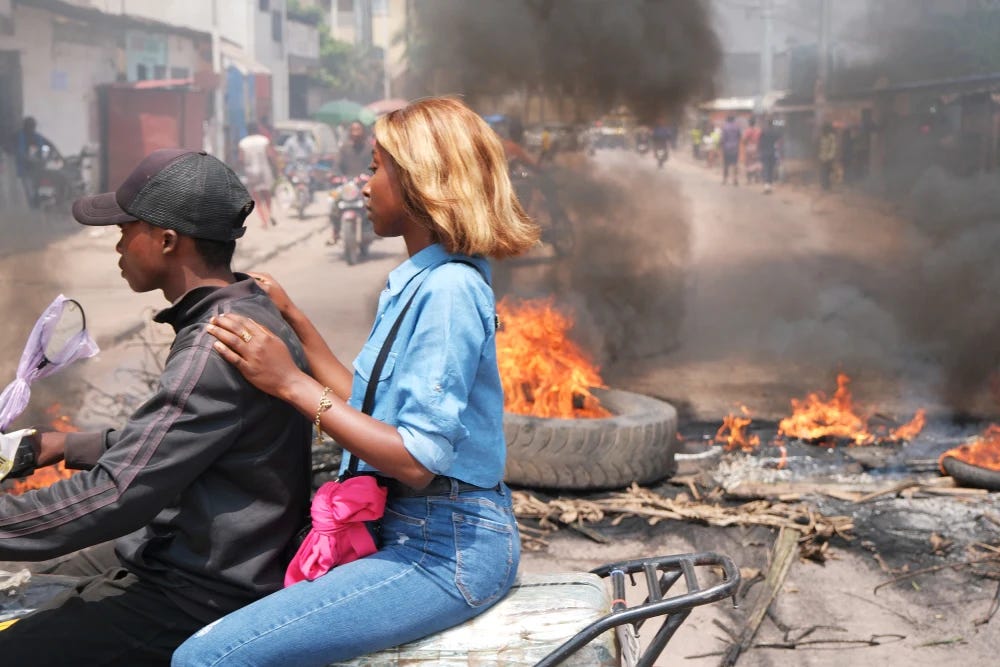Bodies in the Streets as Rebel Group’s Offensive Reignites Long-Running Conflict in the DRC
Over 400,000 displaced in January alone, with escalating violence claiming lives and threatening global stability.
The Democratic Republic of Congo (DRC) is once again engulfed in deadly conflict as the M23 rebel group escalates its push for territorial control in the eastern region. This surge in violence has already led to widespread displacement, with over 400,000 people forced to flee their homes in January alone, according to the United Nations. The latest flare-up is also proving deadly for U.N. peacekeepers, with several losing their lives in firefights in the city of Goma.
The DRC, a vast country three times the size of Texas and rich in mineral resources critical for global technology industries, is no stranger to prolonged conflict. For more than a decade, fighting has been a fixture of life, fueled by the country’s complex ethnic and political divides, as well as its immense natural wealth.
The M23, a rebel group largely composed of ethnic Tutsi fighters, has intensified its campaign, advancing south from Goma in a bid to capture more territory. The group’s leader, Corneille Nangaa, has made clear his ambitions, vowing to extend the conflict all the way to Kinshasa, the nation’s capital. In response, President Félix Tshisekedi of the DRC has called for a massive military mobilization, pledging to “reconquer every inch” of Congolese land under M23 control.
A Renewed Crisis
The DRC has endured violence since its independence from Belgium in 1960, with the latest round of hostilities spiraling out of control since 2021. Clashes between the Congolese military and the M23 rebels—backed by Rwanda, according to the DRC government—reached a critical point in January, with the violence showing no signs of abating.
Tshisekedi’s administration has described the M23’s actions as a “declaration of war” from Rwanda, and a statement from the president’s office revealed the grim situation in Goma. "Corpses litter the streets, water and electricity have been cut off for several days, and residents cannot get food supplies," the statement said.
International Reactions
While the fighting intensifies, the global response has been tepid, with some key international players hesitant to intervene. The situation has even prompted unrest within the DRC’s capital, where protestors have targeted foreign embassies, accusing the international community of inaction.
French Foreign Minister Jean-Noël Barrot met with Tshisekedi in Kinshasa, while other Western countries, including the U.S., have voiced concern. President Donald Trump recently called the crisis a “very serious problem,” and the U.S. State Department has urged American citizens to evacuate the region. However, many observers suggest that this muted reaction opens doors for global powers such as China and Russia to increase their influence in the region.
The M23 Rebel Group
Formed in 2012, the M23 has been at the center of the DRC’s ongoing ethnic conflicts, driven by tensions between the Tutsi minority and the Hutu majority. The rebel group’s roots lie in the 1994 Rwandan genocide, during which nearly a million ethnic Tutsis were killed by Hutu militias. The aftermath of this genocide saw a significant Tutsi refugee population settle in the DRC’s eastern provinces, eventually contributing to the formation of the M23.
The DRC government has long accused Rwanda of supporting the M23, providing military aid and resources to the rebel group. Rwanda, under President Paul Kagame, has denied these accusations, while claiming that the Congolese government has failed to adequately protect ethnic Tutsi communities within the country.
The Economic Stakes
Despite the country’s ongoing instability, the DRC remains a key player in the global economy due to its vast mineral wealth. The DRC is the world’s largest producer of cobalt, a crucial element used in the production of electric vehicle batteries and smartphones. Approximately 80% of the DRC’s cobalt output is controlled by Chinese companies, further complicating the situation. The mining industry, which has been plagued by militia violence, remains vital to global electronics supply chains.
China has condemned the M23’s insurgency and voiced concern about the potential for the conflict to escalate. However, experts say that while the violence poses a threat to the region’s stability, there is currently little immediate risk to the mineral supply.
Rwanda’s Role and Global Complications
Rwanda’s involvement in the conflict has raised serious questions about its role in fueling the insurgency. While Rwanda’s initial support for the M23 in 2012 was met with swift military and diplomatic backlash, the country’s position in the international community has shifted. Rwanda has positioned itself as a key partner in African peacekeeping efforts, and its role in the global economy—particularly with respect to Western investments in the country—has helped secure continued aid despite the ongoing conflict.
However, recent international reactions to Rwanda’s involvement have been more critical. Some Western nations, including Germany and the United Kingdom, have reconsidered their support for Rwanda, but many argue that the country’s strategic importance to the West—especially in countering Russia’s influence in Africa—has shielded it from more severe consequences.
A Growing Humanitarian Crisis
As the M23 continues its advance, the humanitarian crisis in the DRC deepens. Thousands of civilians have been killed or injured, and the violence has displaced hundreds of thousands of people. With the region at a breaking point, the international community faces increasing pressure to address the conflict, while balancing the geopolitical interests of major global players.
The future of the DRC remains uncertain, and the world will be watching closely to see whether the conflict escalates further or if diplomatic efforts can bring about a resolution. What is clear, however, is that the situation in the DRC will have lasting consequences—not only for Africa but for the global community as a whole.


